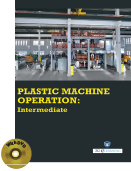Trade and Industrial Education

Plastic Machine Operation: Intermediate combines many different practical and visual skills with knowledge of specialized materials and techniques. Plastic machine operation includes set up, operate, or tend metal or plastic molding, casting, or coremaking machines to mold or cast metal or thermoplastic parts or products. This book will introduce the knowledge and skills for those studying and/or working in manufacturing industry.
About this Book
The information in this book consists of competencies that a person must achieve to prepare molds for composites production, prepare materials for formulae, assemble materials and equipment for production, operate injection molding equipment and blow molding equipment. It also includes competency to monitor process operations and to finish products and components.
About the Plastic Machine Operation Industry
Plastic molding & casting machine operator is responsible for operating and tending metal or plastic molding, coremaking, or casting machines to mold or cast metal or thermoplastic parts or products. Machine operators work at a fast pace on projects that require precision. Opportunities for skilled workers will still arise as more individuals retire in the years to come. As of May 2013, the mean hourly wage for metal and plastic molding, coremaking, and casting machine setters, operators, and tenders was reported by the same source as $14.59. Some machine operators are responsible for one function, while others are responsible for a variety of steps, utilizing different equipment for each. Because of the potential for danger from working close to large machines, safety and cleanliness in the workplace are extremely important. Due to production line requirements, machine operators work in an environment where teamwork is important. They look over and measure parts with precision tools in order to make sure certain parts meet pre-determined quality and cosmetic standards. When parts have passed inspection, the parts go on to the next phase of production. Machine operators are expected to meet production quotas. The level of documentation required varies, depending on the degree of precision needed for the finished product. Machine operators also need to keep track of the number of units that are scrapped due to various errors. Machine operators are required to have a high school diploma or its equivalent training.